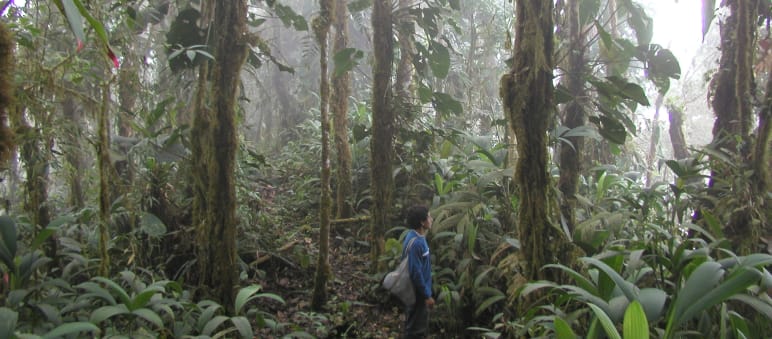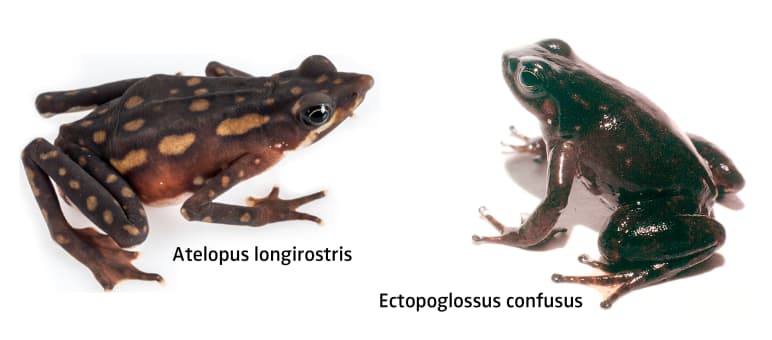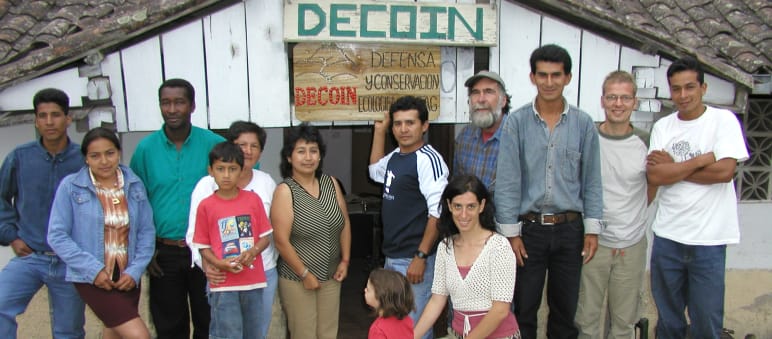Ecuador: Local people triumph over copper mine
Ecuador: The mountain rainforests of northern Ecuador are the scene of one of the longest resistance campaigns against mining in Latin America. Rainforest Rescue has been supporting the affected communities for 25 years. They have now won a spectacular victory in court: The environmental permits for the planned Llurimagua copper mine have been annulled – once and for all.
The mountain rainforests of Ecuador’s Toisan mountain region are uniquely beautiful, but they have a fatal flaw – they are standing on a copper deposit that international mining companies want to exploit. This would have spelled the end of the region’s astounding biodiversity and local communities. Several villages, rivers and whole mountain ranges bursting with life would have had to give way to a vast open-pit mine, tailings piles and reservoirs full of toxic sludge.
For 30 years, the plans of mining companies were repeatedly defeated by the staunch resistance of local communities in Intag, as the area in the tropical Andes north of the capital Quito is called. In the 1990s, they drove out the Japanese company Bishimetals, and in the 2000s forced the Canadian companies Ascendant Copper, Mesa Copper and Cornerstone to throw in the towel. And now they have successfully gone to court to have the state-owned mining company ENAMI and Chilean copper producer CODELCO thrown out.
On March 29, following a lawsuit filed by local people, the Imbabura Provincial Court annulled the environmental permit issued to ENAMI ten years ago: “The Ecuadorian Ministry of Environment issued the permit based on an environmental impact study that violated the rights of communities impacted by the Llurimagua mining project to be consulted on environmental issues and to protect nature,” the ruling stated.
“Environmental studies are not mere formalities. They must be carried out with great care, as they form the basis for environmental management plans. The authorities cannot issue environmental permits without the studies guaranteeing the protection of the environment," Carlos Varela, one of the lawyers in charge of the case, explained at a press conference on the ruling. "The issues are so serious that it is hard to imagine that they are negligent errors, and the court recognized that.” It appears that the mining companies and the Ministry of Environment had been trying to deliberately mislead the public about the effects of mining.
Final victory in court
Since 2014, ENAMI and CODELCO have carried out test drilling and prospecting work on the Llurimagua mining concession to survey the underground copper deposit and plan the mine layout and extraction of the ore. With the environmental permit annulled by the court, all activities must cease permanently, because the court decision in the last instance cannot be appealed.
For people who want to protect nature and their homes from mining, the court decision is an overwhelming victory. With united support, continuous educational and legal work, the village communities have succeeded to date in protecting the environment and enforcing the rights guaranteed in the Ecuadorian Constitution to protect nature and its inhabitants.
“Without all the effort, resistance and support over the many years, this ruling would not have been possible,” explained Cenaida Guachagmira, representative of the affected communities of Intag, at the press conference. “Our community has had to deal with great hardship: families were separated, tourism was endangered and we endured harassment. We have been resisting for 30 years. We must preserve these areas, as we depend on nature and we are also a part of it.”
Ecuadorian constitution guarantees the rights of nature
With its ruling, the court in Imbabura also strengthens the rights of nature, which Ecuador enshrines in its 2008 constitution. The rights of nature are fully binding, and authorities cannot issue environmental permits and concessions in contradiction to them, the court said. As a result, there is no longer any legal basis for the activities of mining companies in the area.
The role of the Ministry of the Environment in the mining companies' plans is particularly questionable. It apparently did not enforce the proper conduct of the necessary studies and mandatory consultation procedures. “The ministry had not made enough effort to map and understand the impact on endangered species. That is a clear violation. We cannot wait until species are extinct before we act. The loss would then be irreparable,” explains lawyer Varela with regard to the threat of the mining project to biodiversity.
The ruling shows once again that the Ecuadorian legal system, despite all its shortcomings and burdens, protects the rights of communities, individuals and nature. This is also evidenced by rulings of the Constitutional Court on cases in other parts of Ecuador, for example against mining in the Los Cedros protected area, on the territory of the Indigenous Sápara, and the Indigenous Shuar in San Carlos de Pananza as well as on the protection of mangrove forests. Problems lie primarily in the lack of enforcement of existing laws by the relevant authorities.
People do not want to sacrifice themselves for the transition to renewable energy
“The community territories are not suitable for mining,” Guachagmira explains further. “The authorities that are supposed to protect us sell us like puppets and make basic rights like health and education conditional on whether we allow mining. We're not going to sacrifice ourselves so that rich people in developed countries can drive electric cars,” she says, alluding to the high copper use of many technologies related to the energy transition.
Carlos Varela adds: “Copper mining is being promoted under the pretext of the energy transition, but it means the destruction of the last forests, which are a carbon sink and help prevent climate change. Destroying the forests will not get us anywhere. We need to look closely at where the resources, metals and minerals for the green energy transition are coming from.”
Global networks of resistance to mining
The work to curb the mining boom continues, as there are many more mining concessions in Intag and many other parts of Ecuador, as well as existing authorized and illegal mines. Rainforest Rescue will continue to support the people in opposing mining in Intag.
The work has also provided valuable insights and experience in defense of the rights of people and nature worldwide. To this end, we have contributed to establish international networks such as Yes to Life, No to Mining to share the lessons learned in Intag and elsewhere with other communities suffering from mining.
The video below shows images of the beauty of the Intag region and the long struggle against mining.
Acción Ecológica 2023. Una sentencia histórica: Corte de Imbabura reconoce que mineras vulneraron derechos en Íntag: https://www.accionecologica.org/wp-content/uploads/SENTENCIA-LLURIMAGUA.pdf
Acción Ecológica 2023. Press conference on April 5, 2023 in Quito: https://www.facebook.com/watch/live/?ref=watch_permalink&v=764043081879088
Corte Constitucional del Ecuador 2023. Sentencia: No 1325-15-EP/22 https://portal.corteconstitucional.gob.ec/FichaRelatoria.aspx?numdocumento=1325-15-EP/22
Corte Constitucional del Ecuador 2021. Sentencia: No. 22-18-IN/21: https://portal.corteconstitucional.gob.ec/FichaRelatoria.aspx?numdocumento=22-18-IN/21
This page is available in the following languages:
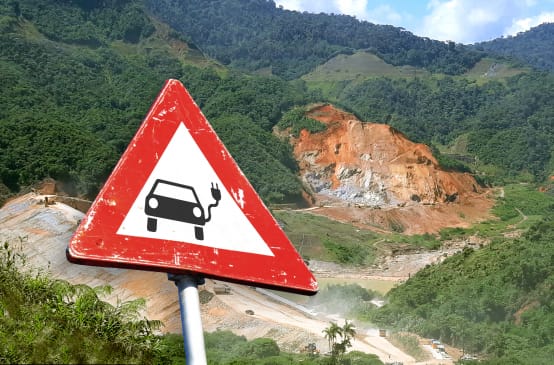
Yes to the ‘green revolution' – but without copper and nickel from the rainforest!
We consume far more metals than is sustainable, and electric cars are exacerbating the problem. We need to transition to a circular economy and new mobility concepts.
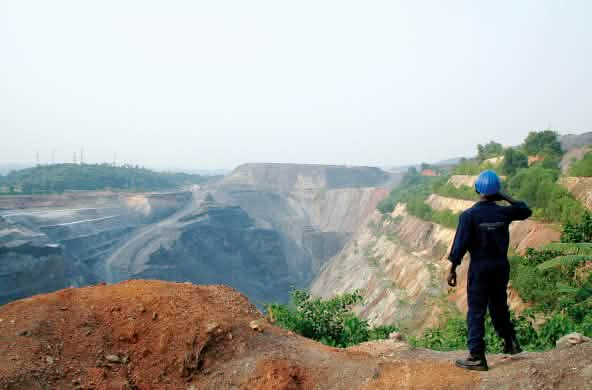
Gold
The romantic notion of gold prospecting has little in common with today’s mining operations. Find out about the environmental cost of our lust for gold – and what we can do to stop the insanity.
